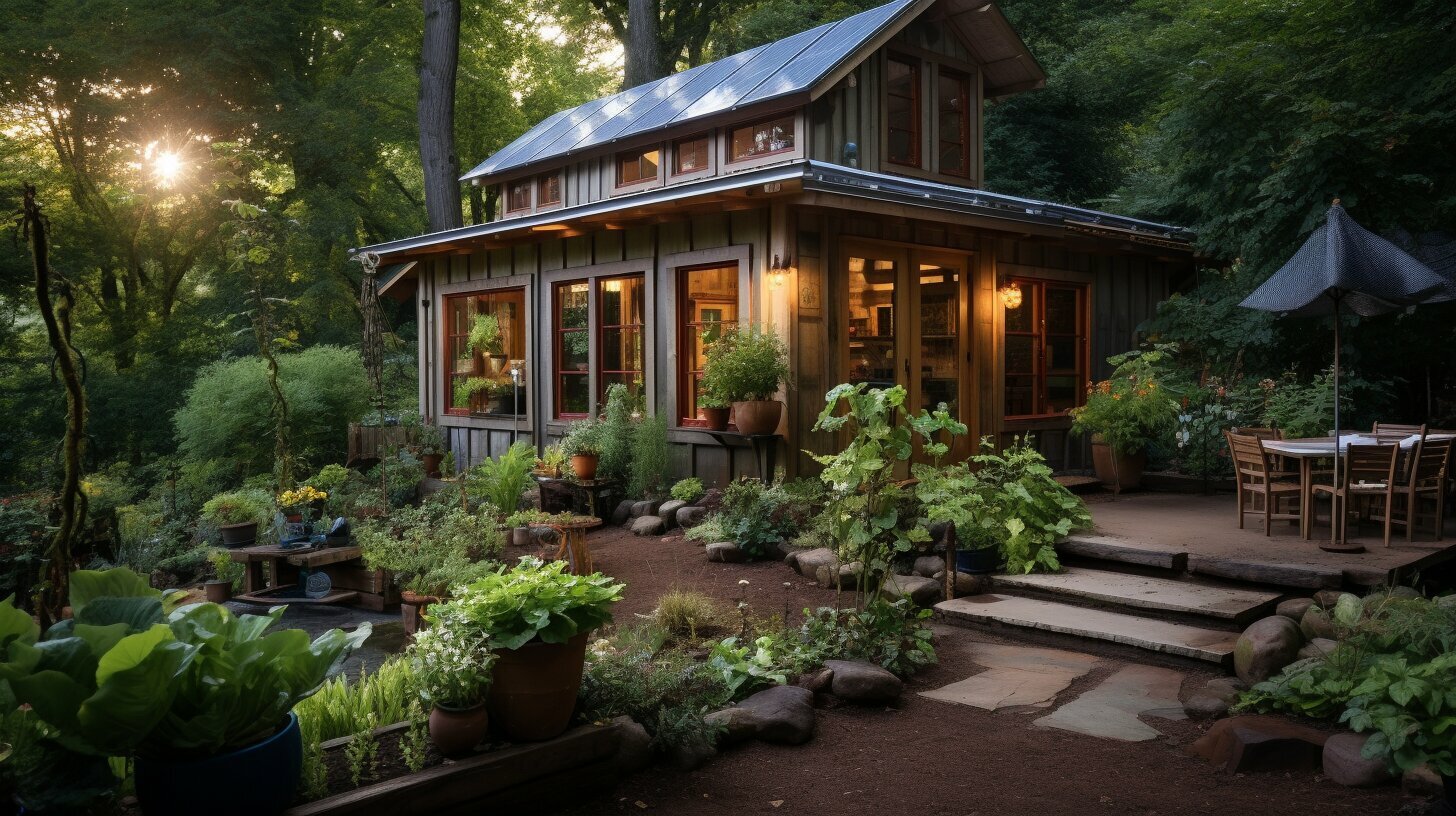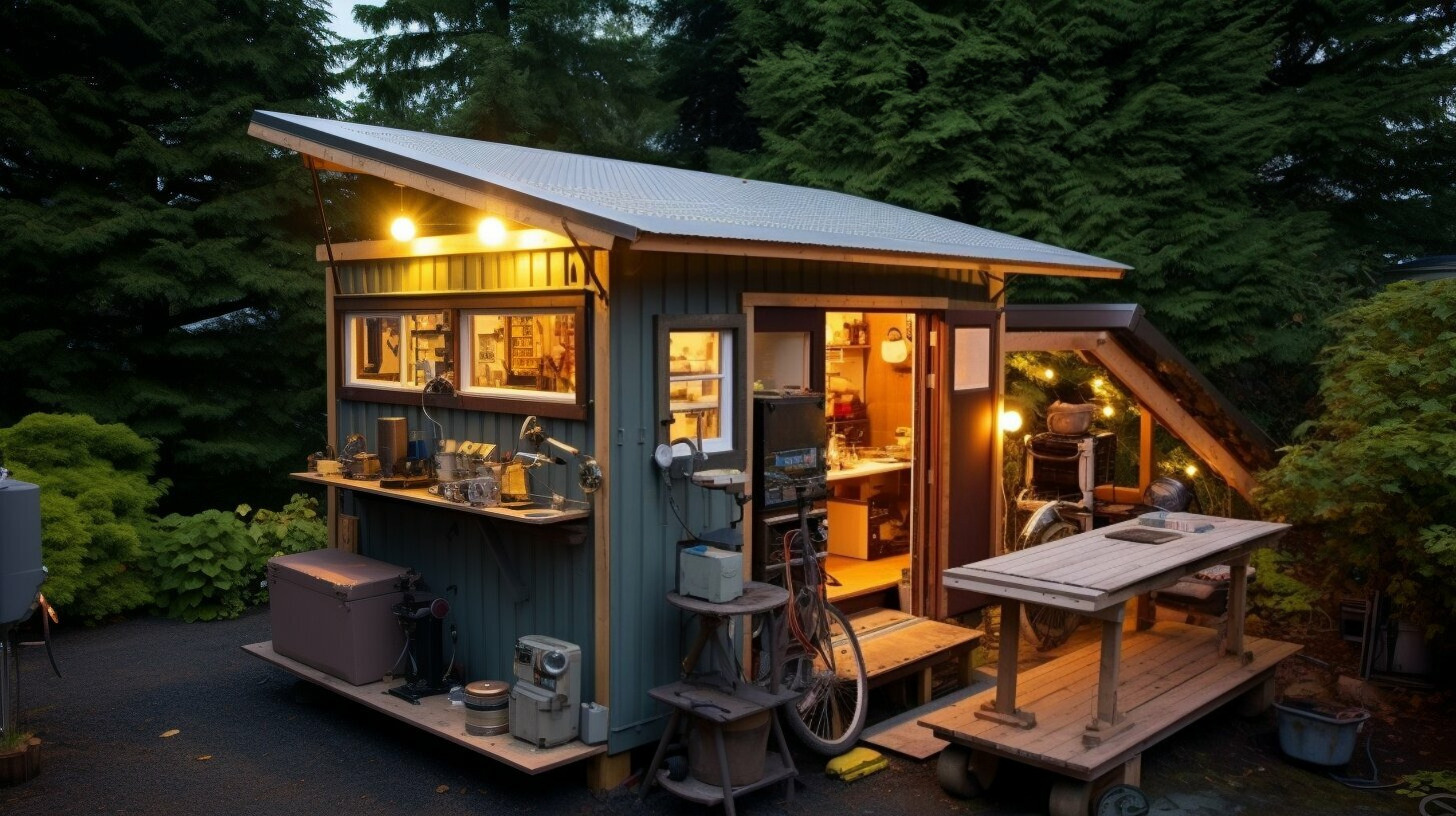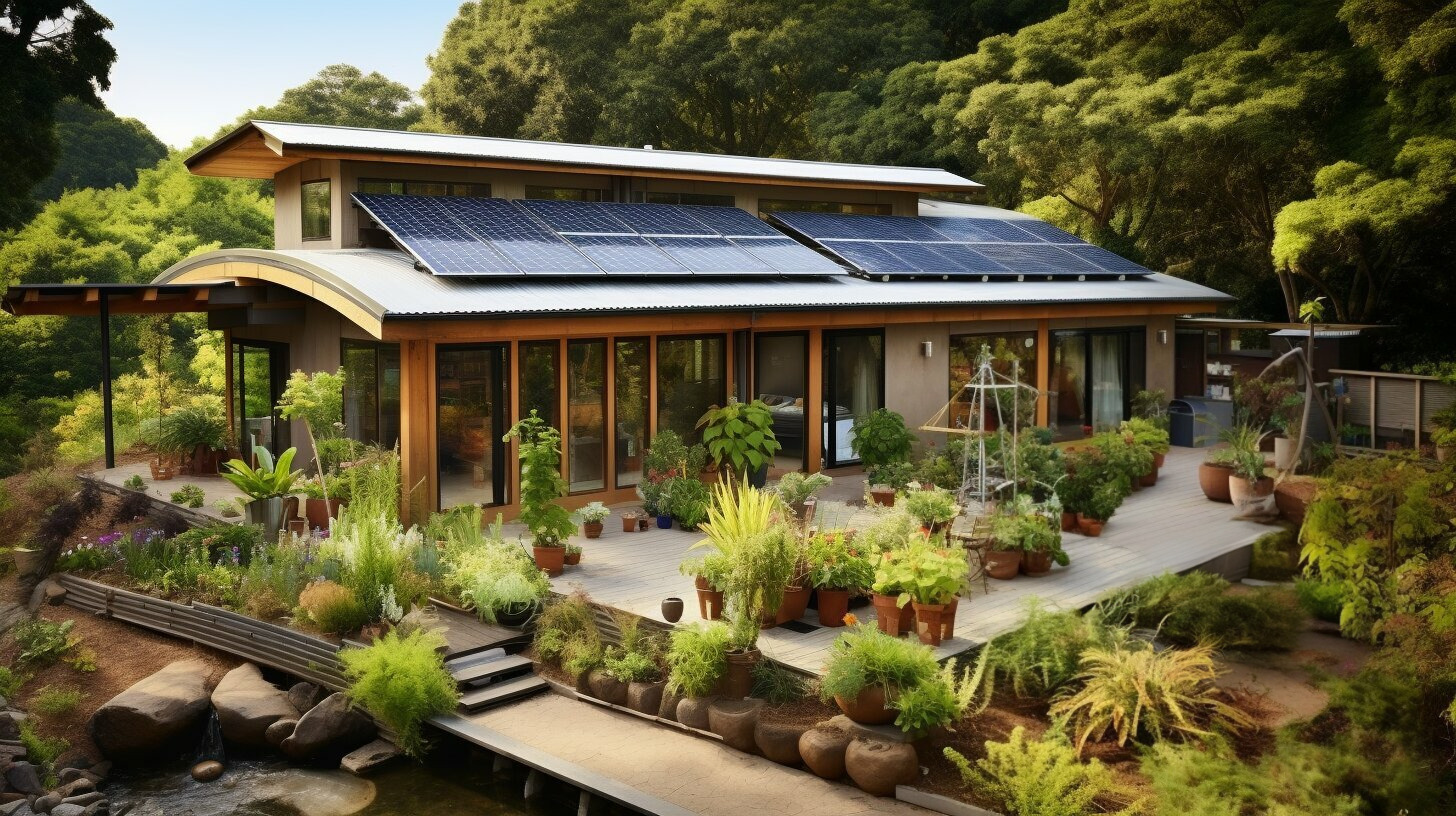If you’re looking to reduce your carbon footprint and live in harmony with the environment, off-grid living may be the solution. Off-grid living, also known as self-sustainable living, involves living independently from public utilities like electricity, gas, and water. Instead, you rely on renewable energy sources and create your own systems for collecting and conserving resources.
While off-grid living may seem daunting, it offers numerous benefits, including financial freedom, increased self-reliance, and a more eco-friendly way of life. In this article, we will explore the principles of off-grid living, offer practical tips for designing an off-grid home, and highlight the environmental benefits of this sustainable lifestyle.
Key Takeaways:
- Off-grid living involves living independently from public utilities
- You can reduce your carbon footprint and live in harmony with the environment through self-sustainable living
- Off-grid living offers numerous benefits, including financial freedom and increased self-reliance
- This article will explore the principles of off-grid living, offer practical tips for designing an off-grid home, and highlight the environmental benefits of this sustainable lifestyle
Understanding Off-Grid Living
Living off-the-grid means disconnecting from the traditional power grid and relying on self-generated power. This means creating a sustainable and eco-friendly lifestyle that is not only good for the environment, but also for your wallet. By reducing your reliance on traditional energy sources and embracing renewable energy, you can reduce your carbon footprint and live a more sustainable lifestyle.
Renewable energy sources such as solar, wind, hydro, and geothermal power offer sustainable alternatives to traditional energy sources. These sources can be harnessed to power your home and reduce your environmental impact. Additionally, alternative energy sources such as biomass and biofuels are great alternatives to traditional energy sources.
Disclosure: When you buy through links on our site, we may earn an affiliate commission.
Living off-the-grid allows you to embrace a sustainable lifestyle and reduce your carbon footprint. It also allows you to become more self-sufficient and reduce your reliance on external systems, providing greater independence and resilience.
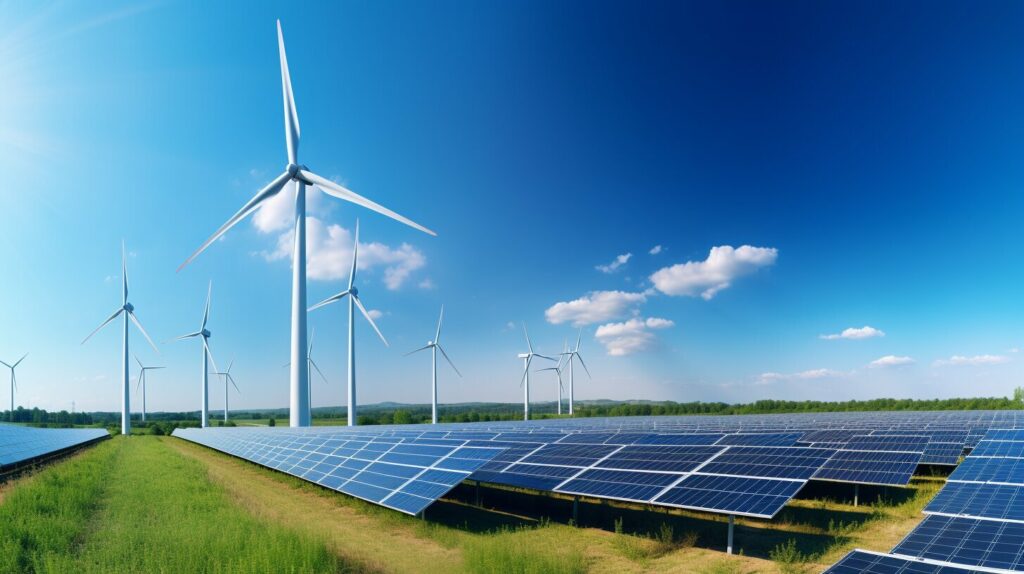
By embracing off-grid living, you not only reduce your environmental impact, but also support the development of a sustainable future for generations to come. By utilizing renewable energy and alternative energy sources, you can help reduce the amount of greenhouse gases being emitted into the atmosphere and decrease your dependence on potentially harmful energy sources.
Living off-the-grid is more than just generating your own power. It’s about adopting a sustainable lifestyle and living in harmony with the environment. By utilizing renewable energy and alternative energy sources, you are taking an important step towards a more sustainable future.
Designing an Off-Grid Home
Designing an off-grid home is all about creating a sustainable and efficient living space that reduces your impact on the environment. To achieve this, you must carefully consider the following elements:
Energy
Renewable energy is a key component of off-grid living. Solar panels are a popular choice for generating electricity, while wind turbines and hydropower systems can also provide energy. When designing your home, ensure that it is oriented towards the sun to maximize solar gain. You should also consider energy storage solutions, such as batteries, to ensure that you have a reliable source of power even on cloudy days.
Water
Water is another essential consideration when designing an off-grid home. Rainwater harvesting systems can provide a reliable source of freshwater for drinking and cleaning. You should also consider installing a greywater system to recycle wastewater and reduce your water usage.
Heating and Cooling
Heating and cooling your off-grid home will be crucial to your comfort and well-being. Passive solar design can help to regulate indoor temperatures, while wood stoves and biomass heaters can provide heat. You should also consider using natural ventilation and insulation to reduce the need for heating and cooling.
Materials
Choosing sustainable materials is key to designing an eco-friendly off-grid home. Look for materials that are non-toxic, locally sourced, and have a low embodied energy. For example, you might consider using reclaimed wood, recycled steel, or natural building materials like straw bales or adobe.
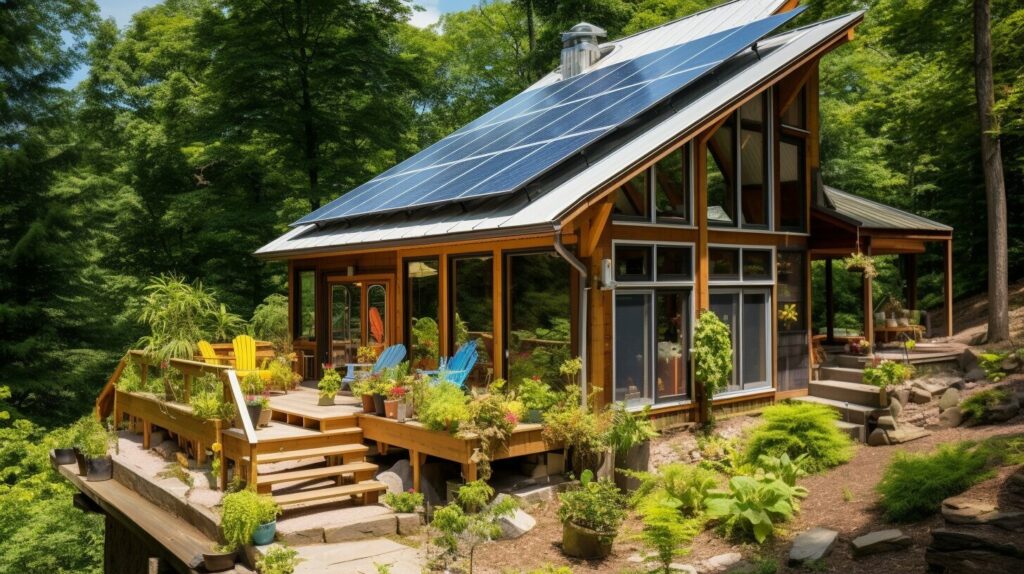
When designing your off-grid home, it’s important to remember that every decision you make will have an impact on your sustainability and self-sufficiency. By taking the time to carefully consider each element, you can create a home that is not only beautiful but also environmentally responsible and energy-efficient.
Embracing Self-Sustainability
You don’t have to live off-the-grid to embrace a more sustainable lifestyle. There are many simple habits you can adopt to become more self-sufficient and reduce your environmental impact. Here are some off-grid living tips to help you get started:
- Grow your own food: Start a garden and grow your own fruits, vegetables, and herbs. This not only reduces your carbon footprint but also gives you access to fresh and organic produce.
- Compost: Instead of throwing away food scraps, start a compost pile. Use the nutrient-rich compost to fertilize your garden and reduce landfill waste.
- Conserve water: Install low-flow showerheads, fix leaky faucets, and collect rainwater for outdoor use. These practices not only conserve water but also reduce your utility bills.
- Reduce energy consumption: Turn off lights and electronics when not in use, use energy-efficient appliances, and hang clothes to dry instead of using a dryer. These small changes can add up to significant energy savings.
By incorporating these practices into your daily routine, you can become more self-sufficient, reduce your carbon footprint, and live a more sustainable lifestyle.
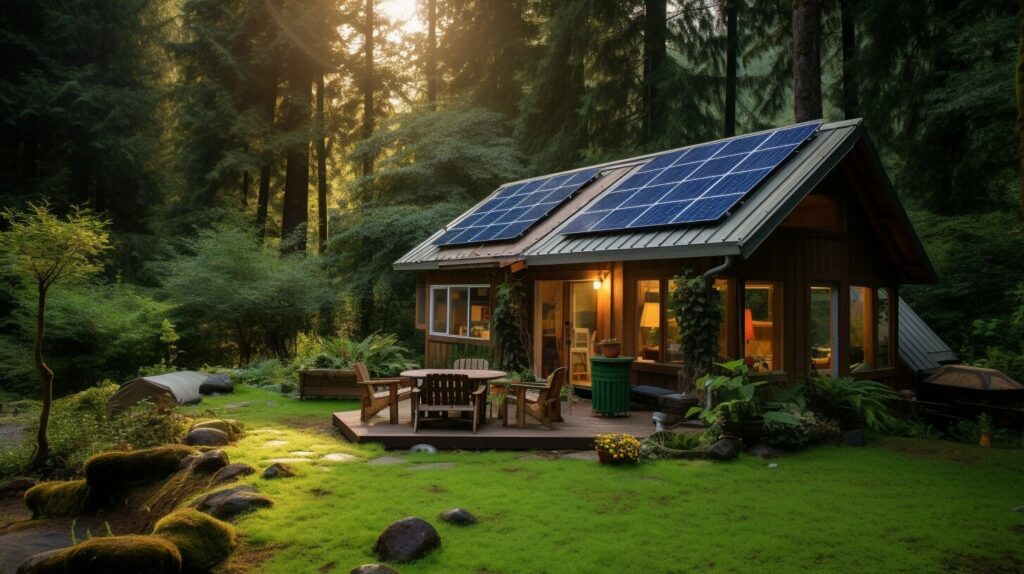
“The greatest threat to our planet is the belief that someone else will save it.” – Robert Swan
Off-Grid Living and Financial Freedom
Living off-the-grid not only provides a sustainable lifestyle but can also save you money in the long run. When you generate your own energy through renewable sources such as solar panels, wind turbines, or hydroelectric generators, you can drastically reduce or eliminate your dependence on utility companies.
By embracing a self-sustainable lifestyle, you can cut down on expenses such as groceries by growing your own food and reducing water consumption through efficient systems and conservation methods. Additionally, off-grid living allows you to become more self-reliant, reducing the need for expensive professional services like plumbing or electrical work.

Not only does off-grid living provide financial benefits, but it also promotes independence. You are in control of your own energy production, waste disposal, and water supply. This autonomy allows for more innovative and creative solutions to sustainability challenges, giving you the freedom to live in harmony with the environment.
Take the first step towards financial freedom and independent living by exploring the possibilities of off-grid living.
Off-Grid Communities: Finding Like-Minded Individuals
Living off-grid can sometimes feel isolating, but it doesn’t have to be that way. Joining an off-grid community can provide a sense of camaraderie and support for your sustainable lifestyle. These communities are typically made up of individuals who share a passion for independent living and eco-friendliness.
Off-grid communities come in many different forms. Some are intentional communities where members live in close proximity and share resources, while others are more dispersed with members living in separate homes but still working together towards a common goal. No matter the form, these communities provide a sense of community and a support system for those seeking to live sustainably.
Living in an off-grid community also offers the opportunity to learn from others and share your own knowledge with like-minded individuals. You can learn about sustainable building practices, alternative energy sources, and self-sustaining living from those who have been living off-grid for years. This exchange of knowledge can further improve your own sustainable lifestyle and bring you closer to achieving complete self-sustainability.
Off-grid communities also provide a sense of security and peace of mind. By living in a community of like-minded individuals, you can have a support system in case of emergencies or unexpected events. Additionally, living in a community can provide a sense of purpose and fulfillment as you work together towards a common goal.
Joining an off-grid community may not be for everyone, but it is worth considering if you are seeking a more sustainable and independent lifestyle. Not only can it provide a sense of community and support, but it can also be a powerful way to make lasting positive change in your life and the world around you.
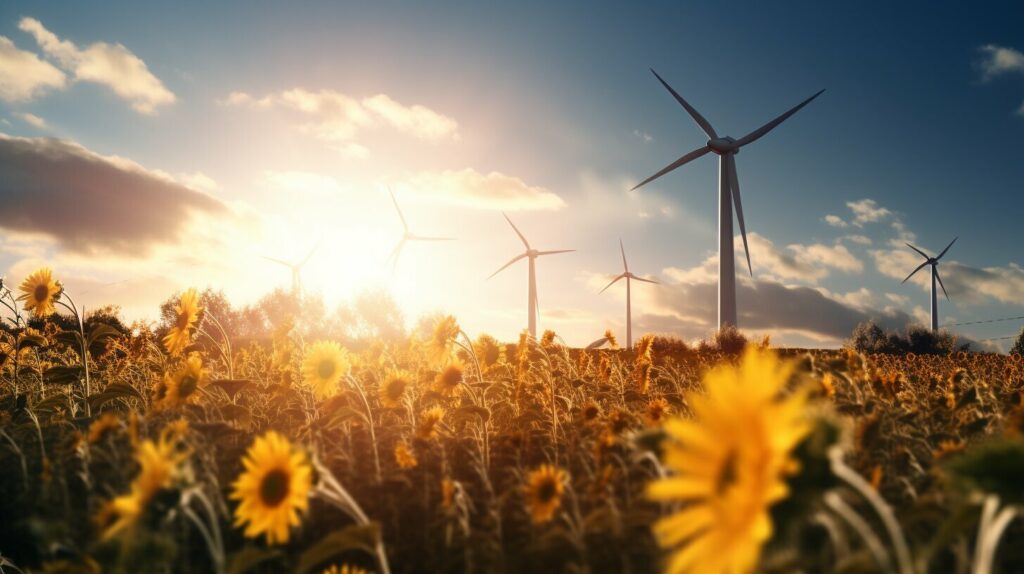
“Joining an off-grid community can provide a sense of camaraderie and support for your sustainable lifestyle.”
Overcoming Challenges in Off-Grid Living
Living off-grid can be a fulfilling and rewarding experience, but it also poses certain challenges. One of the most significant challenges is the need to rely on alternative energy sources. Unlike the traditional electric grid, alternative energy sources such as solar panels or wind turbines require maintenance, regular check-ups, and occasional repairs. It is important to make sure that your energy system is functioning correctly to avoid any disruptions to your daily life.
Another challenge that off-grid living presents is dealing with extreme weather conditions. During power outages or storms, off-grid homes may need to rely on backup generators or other forms of energy to keep essential systems running. It is important to have a plan in place to ensure that you and your family stay safe and comfortable during inclement weather conditions.
However, these challenges should not discourage you from embracing off-grid living. With proper planning and preparation, these challenges can be overcome, and you can enjoy a sustainable and self-reliant lifestyle. When selecting alternative energy sources, make sure to choose ones that are suited to your location and environment and consider investing in backup systems to ensure that you have a reliable source of energy.
Remember, embracing off-grid living means embracing a sustainable lifestyle that reduces your carbon footprint and has a positive impact on the environment. By using alternative energy sources, you can reduce your dependence on non-renewable resources and make a significant contribution to the fight against climate change.
Achieving Off-Grid Living in Urban Environments
Living in a city doesn’t mean you can’t live off the grid. In fact, urban environments offer unique opportunities to incorporate renewable energy and eco-friendly practices into your daily life. Here are some strategies to achieve off-grid living in an urban environment:
- Install solar panels: Even if you live in an apartment, you can still install small solar panels on your balcony or windowsill to power your electronics or even appliances.
- Use public transportation: Reduce your carbon footprint by using public transportation, biking or walking instead of driving.
- Grow your own food: Start a small garden on your balcony or join a community garden to grow your own fresh produce.
- Conserve water: Use a rain barrel to collect rainwater for your plants and use low-flow showerheads and faucets to conserve water.
- Reduce waste: Practice mindful consumption by reducing, reusing, and recycling. Bring your own reusable bags, containers, and water bottles to reduce waste.
Off-grid living in an urban environment may require some creativity and flexibility, but it’s a rewarding lifestyle that offers independence and sustainability. By embracing eco-friendly practices, you can reduce your impact on the environment and inspire others to do the same.
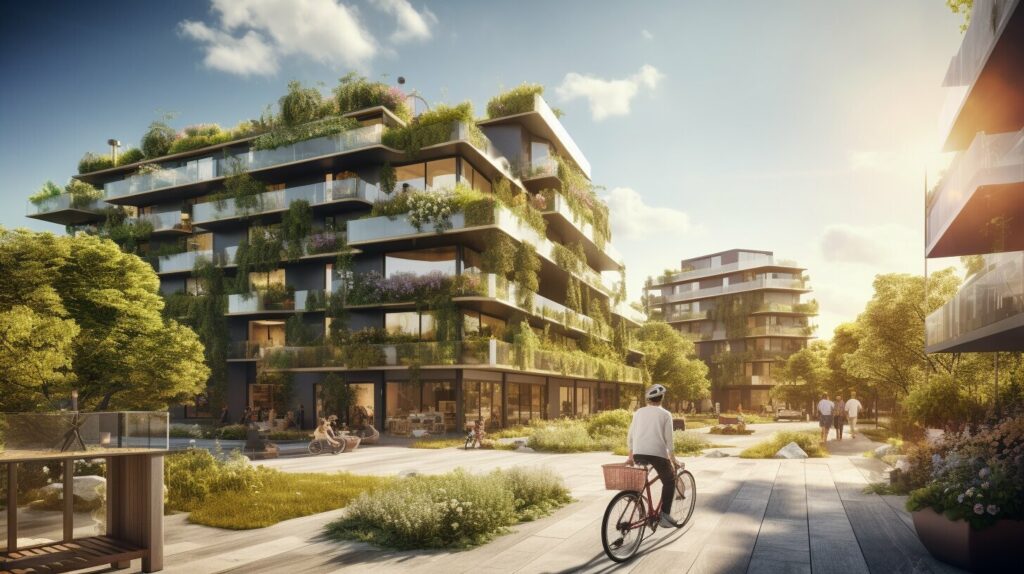
Benefits for the Environment and Future Generations
Off-grid living is more than just a personal choice for a sustainable lifestyle. It has significant benefits for the environment and future generations. By reducing your reliance on fossil fuels and the grid, you can decrease your carbon footprint and minimize your impact on the planet. Your choice of renewable energy sources and eco-friendly practices contributes to the preservation of natural resources and the reduction of greenhouse gas emissions.
Living off-grid also sets an example for others to follow, inspiring them to make more sustainable choices in their own lives. You can be a pioneer in promoting a self-sustainable lifestyle that supports the health and longevity of the earth and its ecosystems.
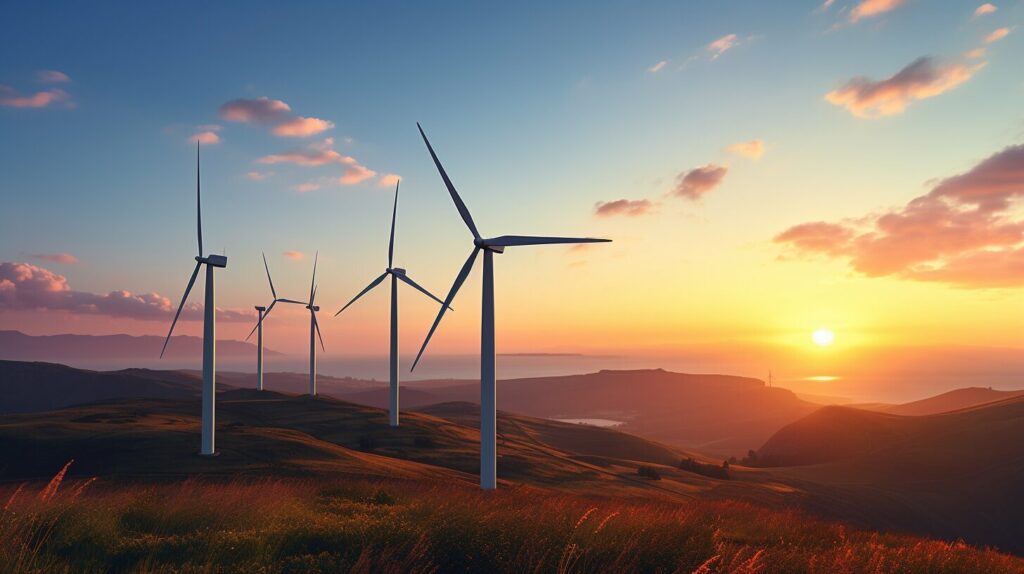
Off-grid living is not only about meeting your current needs sustainably, but also about preserving resources for the future. By implementing renewable energy sources and sustainable practices, you can help ensure that future generations have access to clean water, air, and energy. This is a positive step towards a healthier and more secure future for everyone.
Take the initiative to embrace off-grid living and become a role model for sustainable living. Remember, every small step towards sustainability counts towards a bigger goal of a greener future.
Conclusion
Embracing off-grid living is a bold and admirable lifestyle choice. By living off-the-grid, you are unlocking the potential for a sustainable lifestyle that prioritizes self-sufficiency and environmental consciousness. By reducing your reliance on the grid and embracing renewable energy sources, you can significantly reduce your carbon footprint and make a positive impact on the planet.
Beyond the environmental benefits, off-grid living provides a sense of independence and financial freedom that is hard to match. By generating your own energy and growing your own food, you are taking control of your life and reducing your dependence on outside institutions. This self-sustainable lifestyle can also lead to greater savings in the long run, helping you achieve financial independence and a greater sense of personal empowerment.
Of course, transitioning to off-grid living can be a challenge, and it’s important to approach this lifestyle change with care and consideration. By designing a sustainable off-grid home, embracing self-sustainability, and finding like-minded individuals in off-grid communities, you can successfully navigate the challenges and reap the rewards of independent living.
Ultimately, off-grid living is not just a lifestyle but a philosophy that prioritizes ethical and eco-friendly living. By living off-the-grid, you are contributing to a more sustainable future for yourself and future generations. So take the first step today and join the growing community of off-grid enthusiasts who are making a difference in their lives and the world around them.
FAQ
Q: What is off-grid living?
A: Off-grid living refers to a lifestyle where individuals or households operate independently from the electrical grid and other essential utilities. It involves creating and using renewable energy sources, adopting self-sustainable practices, and reducing reliance on external resources.
Q: What are the benefits of off-grid living?
A: Off-grid living offers several benefits, including reduced environmental impact, greater self-reliance, lower utility bills, and the opportunity to live in harmony with nature. It also allows individuals to have more control over their energy consumption and promotes a sustainable lifestyle.
Q: How can I embrace a self-sustainable lifestyle?
A: Embracing a self-sustainable lifestyle involves adopting practices such as growing your own food, conserving water, using renewable energy sources, and reducing waste. It also requires a mindset shift towards self-reliance and a commitment to living in an environmentally responsible manner.
Q: What considerations are important when designing an off-grid home?
A: When designing an off-grid home, it’s essential to consider factors such as solar panel placement, water collection systems, efficient insulation, and the use of energy-efficient appliances. Additionally, integrating renewable energy sources and designing for optimal energy efficiency will help ensure your off-grid home is sustainable and efficient.
Q: Can off-grid living save me money?
A: Yes, off-grid living can help you save money in the long run. By generating your own energy through renewable sources and conserving resources, you can significantly reduce or eliminate utility bills. Although the initial setup costs may be higher, the long-term savings and increased self-sufficiency make it financially beneficial.
Q: Are there off-grid communities where I can live among like-minded individuals?
A: Yes, there are off-grid communities where individuals can live among like-minded individuals who share a commitment to sustainable living. These communities often provide support, resources, and a sense of camaraderie, making the transition to off-grid living easier and more enjoyable.
Q: What are some challenges I may face in off-grid living?
A: Off-grid living may present challenges such as extreme weather conditions, maintenance of alternative energy sources, and limited access to certain amenities or services. However, with proper planning, education, and preparation, these challenges can be overcome, leading to a fulfilling off-grid lifestyle.
Q: Can off-grid living be achieved in urban environments?
A: Yes, off-grid living can be achieved in urban environments. By adopting renewable energy solutions such as solar panels and wind turbines, implementing water conservation strategies, and practicing eco-friendly habits, individuals living in cities can reduce their reliance on the grid and embrace a more sustainable lifestyle.
Q: How does off-grid living benefit the environment and future generations?
A: Off-grid living contributes to a healthier environment by reducing carbon emissions, conserving resources, and promoting sustainable practices. By adopting a self-sustainable lifestyle today, we can create a positive impact on the planet and leave a better world for future generations.

